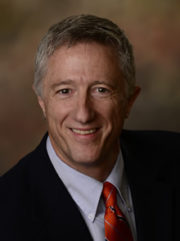
David R. Crumbley MSN, CWCN
By Stephen Spotswood
AUBURN, AL—As more and more veterans begin seeking care in the civilian sector, it’s becoming increasingly apparent that medical centers and educational institutions need to adapt to serve this new patient population.
That need was certainly apparent to David R. Crumbley MSN, CWCN, in 2012 when he took the position of Assistant Clinical Professor at Auburn University’s School of Nursing. Having just retired after 20 years in the Navy—a career that included several leadership positions dealing with developing care for returning veterans—Crumbley brought with him an acute awareness of the unique challenges in treating veterans.
“I’m teaching these students in early 2012—these students who are 20 or 21 years old. I’m teaching about trauma treatment and they’re like—we’re still fighting in Afghanistan?” Crumbley said.
Meanwhile, the new assistant clinical professor was introducing himself to patients and staff at nearby hospitals. When he introduced himself as just-retired military, he found that veterans and family of veterans would come out of the woodwork.
“Military people, especially guys who have been overseas, they don’t talk about what they’ve done or what they’ve seen or how things are going with civilian healthcare personnel very readily. They don’t feel like they can relate,” explained Crumbly, who retired from the Navy as a commander. The result are veterans who go unrecognized at civilian hospitals and whose ailments might be symptoms connected to their service—a diagnosis difficult to make if there’s been no conversation about their time in the military.
Along with his colleague at Auburn, Libba McMillan, RN, MSN, PhD, Crumbley helped develop Project SERVE (Students Education Related to the Veteran Experience), which integrated veteran-specific training into nursing school curricula. The goal was to expose nursing students to veteran treatment and military culture that they would not otherwise receive.
Project SERVE is designed as an elective for nursing school students that includes modules on military culture, traumatic brain injury (TBI), post-traumatic stress disorder (PTSD), suicide prevention, polytrauma, amputation and deployment and combat stress on families and children. Students in the program also travel to Walter Reed National Military Medical Center (WRNMMC) in Bethesda, MD, where Crumbley had been stationed from 2007 to 2011 and helped develop the Complex Wound and Limb Salvage Program.
At WRNMMC, students observe clinical rotations, moving from amputee rehabilitation to the surgical ICU, inpatient and outpatient mental health units, inpatient TBI unit and surgery and post-operative care units. They are also given the opportunity to talk with patients and the families of patients as they move from unit to unit. Between rotations, they attend panel discussions of current and former patients and hold discussions with members of the healthcare team.
During the four-day trip to Bethesda, they also participate in a tour of war memorials in Arlington and the National Mall. Individual students are assigned to each memorial and given the task of doing research ahead of time so they could act as tour guide for the rest of their group.
“The biggest part of that trip is understanding military culture,” Crumbley explained.
In a paper published in the Journal of Professional Nursing in 2017 that detailed how Project SERVE functions, Crumbley and his colleagues wrote that, “Students repeatedly recognized understanding the military culture as most significant in establishing therapeutic communication and providing empathetic nursing care.”
That communication begins with asking each patient whether they’ve served in the military. It’s a question that Crumbley—and many healthcare professionals—believe doesn’t get asked nearly enough. Crumbley just finished chairing the Have You Ever Served program—an initiative managed by the American Academy of Nursing encouraging healthcare providers to ask about and document their patients’ military background.
“It’s so important to first ask that question,” Crumbley explained. “Let’s say you have a 25-year-old Marine who just got out of the military. He goes home. He gets into arguments. He winds up in the ER with a busted hand. Is he suffering from PTSD? You won’t know unless you ask the question. And, by asking that question, you also become closer. Your relationship with that patient changes.”
For students who have completed Project SERVE, that question has become second nature. Several graduates have reported back to Crumbley that their experience visiting WRNMMC and the lessons learned there have provided a firm basis for communication with veteran patients.
Now Crumbley and his colleagues are looking to grow Project SERVE beyond a 12-student elective. “We want to expand it and create a continuing education program so that we can provide this kind of training for all the nurses of Alabama.”
But he recognizes that no program can teach nurses everything they’ll need to know to treat veterans, and so Crumbley is a strong advocate for veteran case managers in civilian medical centers.
“You need to have resources in hospitals that nurses and healthcare providers can go to that understand the veteran, the veteran system, and veteran needs,” Crumbley explained. “As more veterans are being seen in the community, it’s going to be more and more relevant. You need someone who understands what benefits are available for veterans.”

